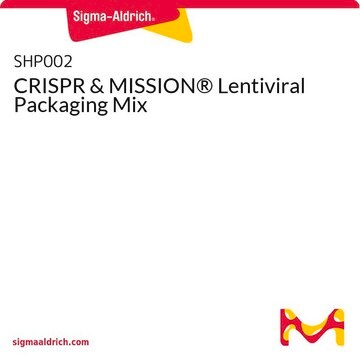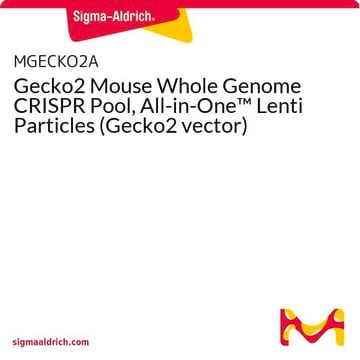HGECKO2G
Gecko2 Human Whole Genome CRISPR Pool, gRNA Only Lenti Particles (Gecko2 vector)
About This Item
Produits recommandés
Conditionnement
pkg of 8x25 μL (vials)
Niveau de qualité
Concentration
5x108 VP/ml (via p24 assay)
Application(s)
CRISPR
Conditions d'expédition
dry ice
Température de stockage
−70°C
Catégories apparentées
Description générale
Application
Caractéristiques et avantages
- Use CRISPR nucleases to knockout protein-coding genes to assess their function
- Efficiently screen the whole human genome (16,000+ genes) at the bench-top without robotics or specialized equipment
- Numerous built-in enrichment and depletion controls allow researchers to confidently gauge the success of their pooled screening experiments
- Lentiviral CRISPRs can infect a broad variety of mammalian cells by transducing a single guide RNA (sgRNA) to a Cas9-expressing human cell line to facilitate gene knockout for screening applications.
- Use the dual vector system for the human GeCKO version 2 libraries for human cell lines that have Cas9 already integrated into the genome.
- Use puromycin gRNA selection after transduction.
Notes préparatoires
Autres remarques
Informations légales
Code de la classe de stockage
12 - Non Combustible Liquids
Classe de danger pour l'eau (WGK)
WGK 3
Point d'éclair (°F)
Not applicable
Point d'éclair (°C)
Not applicable
Certificats d'analyse (COA)
Recherchez un Certificats d'analyse (COA) en saisissant le numéro de lot du produit. Les numéros de lot figurent sur l'étiquette du produit après les mots "Lot" ou "Batch".
Déjà en possession de ce produit ?
Retrouvez la documentation relative aux produits que vous avez récemment achetés dans la Bibliothèque de documents.
Les clients ont également consulté
Articles
Lentiviral vector systems prioritize safety features, with design precautions preventing replication. Good handling practices are essential for use.
Get tips for handling lentiviruses, optimizing experiment setup, titering lentivirus particles, and selecting helpful products for transduction.
Protocoles
Lentivirus versions of genome modification technologies support successful CRISPR, RNAi, and ORF experiments.
FACS sorts cells based on light scattering and fluorescence for objective cell analysis.
Notre équipe de scientifiques dispose d'une expérience dans tous les secteurs de la recherche, notamment en sciences de la vie, science des matériaux, synthèse chimique, chromatographie, analyse et dans de nombreux autres domaines..
Contacter notre Service technique












